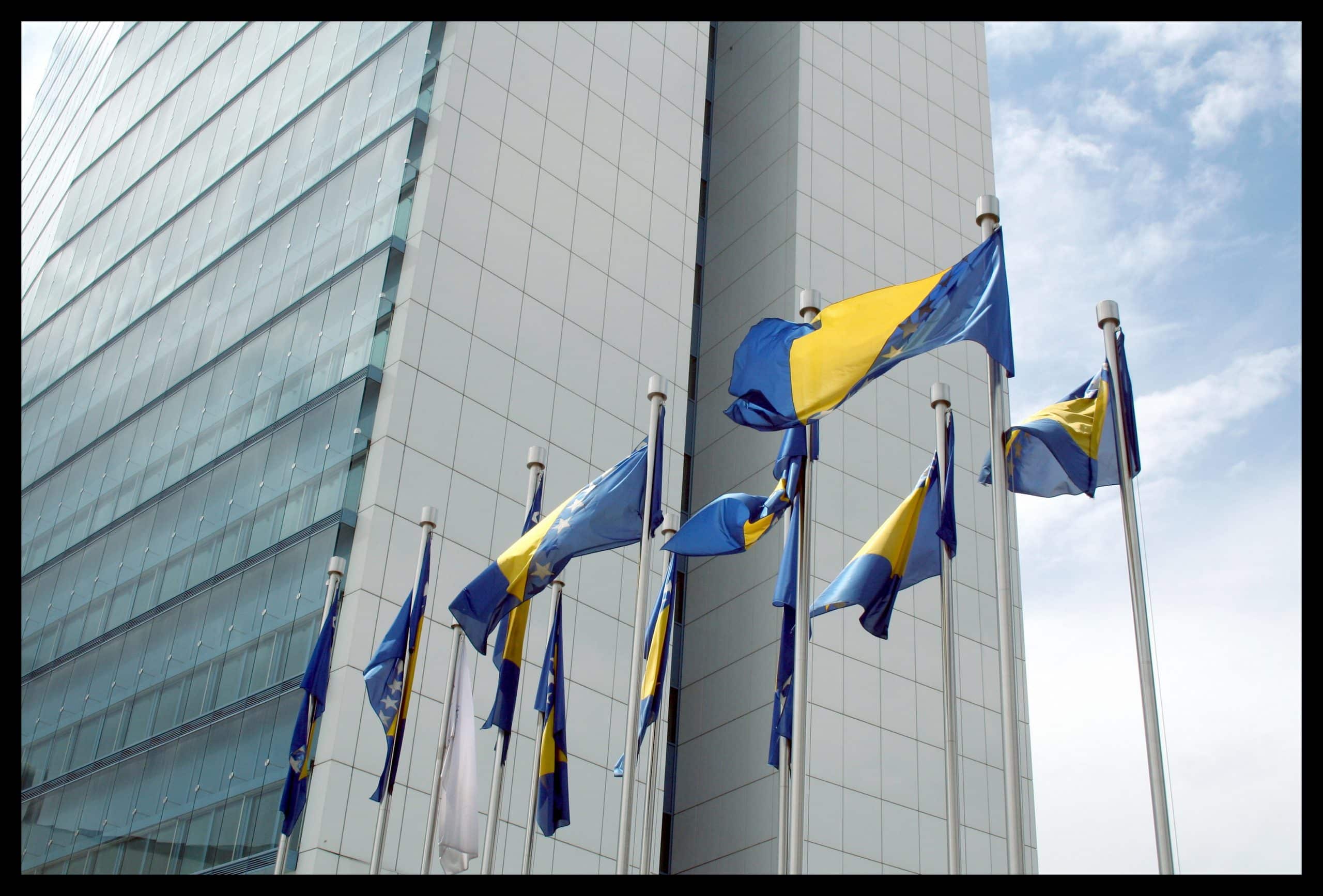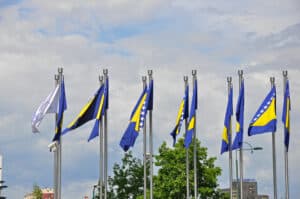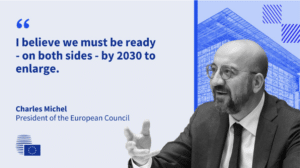On 7 October, elections were held in Bosnia and Herzegovina for more than 500 positions in the country’s complex political system, agreed upon in the Dayton Agreements of 1995 that ended the war. Voters were able to elect lawmakers for the national House of Representatives, for the entity parliament of either the Federation of Bosnia and Herzegovina (F-BiH) or the Republika Srpska (RS), and for the three members of the rotating presidency of the country. Serbs in the RS were also able to elect a new President for their entity. Like in earlier national elections, citizens have mainly voted along ethnic lines, and the outcomes allow little room for political reforms or change.
At 53% out of 3.3 million eligible voters, the voter turnout was quite low, and around 1% lower this year than in the 2014 national elections. Interestingly, a difference in voter turnout is visible between the two Bosnian entities, the Bosniak-Croat Federation of Bosnia and Herzegovina (FBiH) and the mainly Serbian Republika Srpska (RS): in the former, turnout was 53.4% of eligible voters, while it was over 57% in the latter. Even though the elections took place without turmoil, international observers like the United States and the OSCE have expressed their “concerns about the electoral process” and the fairness of it in general, but in particular about the number of diaspora eligible to vote and identification fraud.
SNSD regains Serbian seat of BiH’s presidency
Heading news articles internationally was the fact that Milorad Dodik, leader of the Alliance of Independent Social Democrats (SNSD) has won the Serbian seat in the rotating presidency of Bosnia and Herzegovina, with 53.8% of Republika Srpska votes in his favour. Dodik has until now been the president of that entity, having won votes for the position in his favour in every election since 2006. Known for his nationalist stand, he has proclaimed to place the interests of the Bosnian Serbs first, and has stressed more than once that he wants Republika Srpska to secede from Bosnia and Herzegovina. Also, he is very keen on Republika Srpska’s relations with both Serbia and Russia, increasingly seeking close ties with these states and being critical towards the European Union. Following the first election results, Dodik deemed his win a “clear-cut victory,” and that he would take up the seat “to work above all and only for the interests of the Serbs.” He has also stated that he wants his first meetings as national president to be with the presidents of Russia and Serbia, Vladimir Putin and Aleksandar Vučić respectively, and that one of his first actions in his new position will be to submit an initiative to acknowledge the Crimea as part of Russia. He has also stated that he will oppose any Bosnian effort to join NATO. Experts fear that, with moves like these, Dodik’s seat in the national presidency will make him and his policies even more divisive than he was in his former position.
The runner-up for the position, Mladen Ivanić of the slightly more moderate Coalition Together for Srpska, lost to Dodik by around 10%. After the first result declared Dodik the winner of the Serbian seat, Ivanić contested the results leading to his loss, and demanded a recount of the votes.
Not only did the SNSD regain the Serbian seat in the national rotating presidency, it also saw its candidate Željka Cvijanović win the presidency of Republika Srpska. Cvijanović is a close ally to Dodik, which implies that many of the latter’s nationalist policies and points of view will be continued by his successor. Furthermore, the SNSD has gained more votes for the National House of Representatives than it had in 2014, and its mandate for the Republika Srpska entity parliament remained the same. All in all, with its candidates having won the two most influential seats it could win and its popularity higher than in the 2014 national elections, the SNSD has acquired quite a powerful position in the Serbian entity.
Moderate Komšić elected for Croatian presidency seat over nationalist Čović
Quite a change has taken place regarding the Croatian seat of the national presidency. After having been absent from it for four years, Democratic Front (DF) leader Željko Komšić has won the Croatian seat of the national presidency, with almost 20% more votes than the current occupant of that seat, Dragan Čović of the Croatian Democratic Union of Bosnia and Herzegovina (HDZ-BiH). This effectively means that a more moderate candidate has won the seat over a nationalist one, and experts say that Komšić’ moderation has not only won Bosnian Croats’ votes, but also those of Bosniaks. However, this makes his win hard to digest for Bosnian Croats. Many of them say that he owes this win, as well as earlier ones, to the votes he secured from Bosniaks, instead of getting a mandate from Bosnian Croats for their seat. Čović and HDZ-BiH, after taking notice of their defeat, have accused Komšić of this as well. It means, the DF-leader’s critics claim, that he would not sufficiently protect the interests of the Bosnian Croats and thus not make for a suitable candidate for the Croatian seat of the presidency. Bosnian HDZ-alliances have underlined this claim in the past. Moreover, the HDZ party in Croatia, of which HDZ-BiH is a sister party, has also stressed its discontent with Komšić’ victory. HDZ-leader and Prime Minister of Croatia Andrej Plenković stated that Čović deserved better than defeat after what he has done for Croats as the current Croat president of Bosnia and Herzegovina, especially regarding the country’s wish to join the EU. Despite these criticisms, Komšić has promised that he would serve all Bosnians, even those who had not voted for him.
Bosniak seat returned to SDA
Šefik Džaferović from the mainly Bosniak Party of Democratic Action (SDA) has won the Bosniak seat of the national presidency over Social Democratic Party of Bosnia and Herzegovina (SDP) candidate Denis Bećirović, by around 4%. This means that the position remains in the hands of the more nationalist SDA over the more moderate social democrats of the SDP, like it has been in almost all of the past 20 years. Džaferović is an ally to current Bosniak president Bakir Izetbegović, and after he declared his victory, expressed his admiration of Izetbegović for the good things that he has done for the country, and stated that he himself plans to continue those policies: “I will be happy to be like him.”
Loss for presidency seat, but overall growth for the SDP
Another interesting change that has taken place in the national House of Representatives, is in the amount of votes that the two main moderate, citizens’ parties in the FBiH, the SDP and the Democratic Front – Citizens’ Union (DF-CU) have gained. Whereas the SDP has gained almost 15% of the vote, over 4.5% more than in 2014, the DF-CU has gained 9.5%, a loss of almost 6%. Interesting here, however, is the fact that DF-CU-founder Komšić is a former SDP member, who broke away and formed his own party over disagreement with the SDP leadership. Had the SDP and the DF-CU made amends and formed an alliance, then together they would have gained almost as many votes as the more nationalist SDA in both the national and the FBiH parliaments, which would have made their alliance quite influential. This would likely have led to an, albeit small, chance of actual reforms being carried through in these parliaments.
Little room for reforms
All in all, the 2018 general elections in Bosnia and Herzegovina have shown little change when compared with earlier ones. Bosnians still mainly cast their votes along ethnic lines, and ethnic-nationalistic parties again hold a majority in all parliaments and in the presidency seats. However, the SDP and other multi-ethnic parties have experienced some growth. This shows that there are people in the country who would like to see a change towards multi-ethnic politics and reform. Hopefully, this trend will continue, and multi-ethnic parties will gain more ground in the future. For the current government, however, the chance of tangible reforms being carried through is not much higher than it was in the past years.
Sources: BiH Central Electoral Commission 2018, Radio Free Europe, Radio Free Europe 2, Reuters, BBC, B92, Balkan Insight, Balkan Insight 2, Balkan Insight 3, Balkan Insight 4
Photo: Flickr (no changes made)



